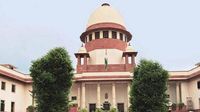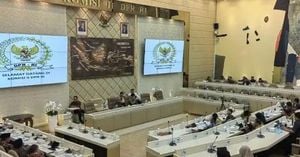The Supreme Court of India has recently upheld the Bombay High Court's directive to form a Special Investigation Team (SIT) to investigate serious allegations against Anand Jain, a prominent businessman closely associated with Mukesh Ambani. This move comes in light of claims of fraudulent misappropriation exceeding Rs 2,000 crore, leading to significant concern regarding the integrity of financial practices within powerful circles.
On March 17, 2025, the Supreme Court bench composed of Justices J.B. Pardiwala and R. Mahadevan praised the courage displayed by the Bombay High Court, stating, “We admire and appreciate the courage with which the High Court has passed the order. This is what is expected of any High Court.” Their decision emphasized the importance of maintaining confidence in the investigative process, particularly amidst allegations as grave as those concerning Jain.
The background of this case traces back to complaints filed by Shoaib Richie Sequeira, a Mumbai-based businessman, who initially approached the Economic Offences Wing (EOW) of the Mumbai Police in December 2021 and April 2023 with claims against Jain and his company, Jai Corp. Sequeira contended that the police were not conducting an impartial investigation, prompting him to seek judicial intervention.
The Bombay High Court, in its ruling from January 31, directed the Central Bureau of Investigation (CBI) to look more closely into the allegations against Jain. The complaints specifically target him for allegedly defrauding investors, misappropriating public funds for personal profit, engaging in fraudulent round-tripping of funds through shell companies, and creating fictitious invoices for dubious transactions.
In the face of these serious accusations, Jain sought relief in the Supreme Court by challenging the Bombay High Court’s order. However, the apex court opted not to interfere, and reiterated the importance of a thorough investigation by the SIT as ordered by the High Court. The Supreme Court noted, “It is the least that the High Court could have done in the peculiar facts and circumstances of the case. The Zonal Director CBI, Mumbai, shall now proceed to comply with the directions issued by the High Court and undertake the investigation in accordance with law.”
The Supreme Court’s acknowledgment underscores the need for accountability. As per the allegations, Jain and his associates raised Rs 2,434 crore from the public, promising investment in urban infrastructure development. Yet, the primary charges suggest these funds were misappropriated for personal enrichment.
Additionally, Jain's operations are reportedly interlinked with Urban Infrastructure Venture Capital and Urban Infrastructure Trustees Ltd, which also fall under scrutiny. Complaints have accused these entities of being involved in deceptive practices, such as mislabeling losses and manipulating records to obscure real capital flows. Legal experts indicate these allegations could characterize severe violations under both the Indian Penal Code (IPC) and the Prevention of Money Laundering Act (PMLA).
Interestingly, Jain's reputation extends beyond these allegations. Known as a close aide to Mukesh Ambani, he has often been referred to as the “third son” of Reliance Industries founder, Dhirubhai Ambani. In fact, Jain was once recognized as one of the richest Indians, securing the 11th position on Forbes’ list of India’s wealthiest individuals in 2007. His ventures have included plans for developing special economic zones alongside Ambani, showcasing his significant role in one of India's major business landscapes.
During the court proceedings, Jain’s senior counsel, Ameet Desai, attempted to characterize the initial complaints as an “abuse of the process of law,” arguing that the request for an SIT probe was excessive. Yet, the Supreme Court rejected this notion, maintaining that the pursuit of justice must remain untainted by allegations of bias or misconduct.
The Supreme Court ruled that it remains open for Jain and Jai Corp to explore further legal remedies, including potentially challenging the validity of the FIR that the CBI has registered. The apex court stated, “We leave it open for the parties to avail appropriate legal remedies available to them, including challenging the legality and validity of the FIR.” This leaves the door ajar for Jain to navigate the complexities of the legal system as the SIT investigation unfolds.
This situation marks a critical juncture, highlighting not only the pressing matter of financial accountability but also the integrity of corporate governance among India’s elite. As allegations of collusion and deceit shake the foundations of trust in business practices, the forthcoming investigations will be pivotal in determining the legal course for Anand Jain and the reputation of his enterprises.
In what can only be described as a watershed moment for business ethics in India, stakeholders across the spectrum will be observing how the judiciary handles this high-profile case. The proceedings will not only influence Jain's future but may also send ripples through the corporate community, potentially tightening the scrutiny on financial practices among the powerful.
The inquiry spearheaded by the SIT aims to restore faith in the judicial process while addressing claims of significant financial misconduct. As the dust settles on this case, the wider implications for regulatory frameworks and corporate conduct in India will undoubtedly come into clearer focus.








